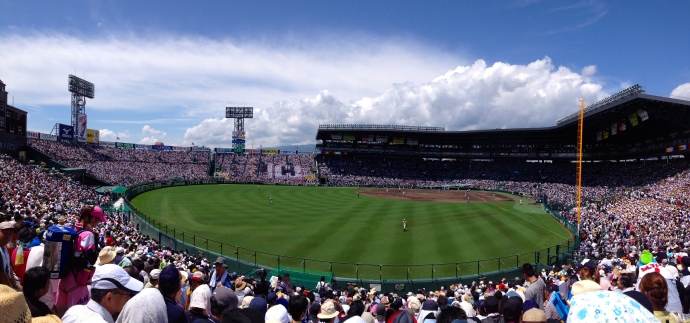Maybe they won’t see me. It was a wishful thought. As I approached the dusty sports yard of Toryo High School, the clanking of metal bats and rapid chatter grew louder, as did my doubts. Who am I kidding, I’m in Japan. “Konnichiwa!” The first greeting rang out like cannon fire. My cover was blown. Almost instantly the call had seized the field. For several long seconds, the game stopped and everything fell silent. With military precision, every white cap was removed and every head bowed in my direction. Sweat glistened on buzzed heads as the punishing July sun bore down on us. My feet marched on through the silence. “uh, hey guys!” Sheepishly, my hand waved in the air like a white flag. After a long second I was released from the spotlight. “Hai!” The game was back on. I had made it through the front lines. With a silent smile, a girl student directed me toward a bench overlooking home plate. In a few seconds another girl, clearly one of the team managers, approached my front row seat with an ice-coffee in her hand. I was getting the VIP treatment. I thanked her and she returned with a smile to her post at the scoreboard. I cracked open my beverage and sat back to enjoy the show.
It was the third inning. Two Japanese names were written on the scoreboard. I could only make out half the kanji, but quickly found the matching characters on the backs of two uniforms out on the field. I was happy to see that one of my former freshmen students had now risen to the ranks of team captain. He stood sternly by the chain link barrier of the makeshift dugout, barking out orders to his comrades. His team was down by one run. The opponent? Also Toryo High School. Both sides were donning their daily white practice uniforms for the scrimmage. I scanned the field to gauge the authority structure of the match. Not a single teacher or coach was in sight, and aside from the three team manager girls, I was the lone spectator. It was a student played, student coached, student officiated game.
“Onegaishimasu!” As the next batter approached home-plate, he removed his helmet for a quick bow to a student donning a mask and padded shield – the official umpire. Before hunching over the back of the catcher, he held up his fingers to signal the count. 2 and 1. The chatter on the field rose again as the pitcher cast a gun-slinger glare at the dangerous lead from first base. After breaking the stare-down, the pitch was thrown. Ball. As soon as the spank of leather sounded, the catcher was on his feet firing to second base. A cloud of dust exploded from the scene as the runner sprawled headlong to safety. The second base umpire extended his arms, sparing the runner. The chatter rose again as the ball returned to the mound. 1 out, runner on second. Another head was bowed at home plate and another dangerous lead was taken. With a commanding voice the team captain stepped out from the dugout. Two fingers across the chest, tap the wrist, tip the hat… the encoded order was received with a nod. Bunt was shown as the pitcher began his wind-up. Sharp calls rang from the infield as the third baseman collapsed in. But no! The batter retreated his bunt as he slashed at the pitch. Ping! The third-baseman hit the dirt as the ball narrowly missed his face. The race was on. The third base coach-student furiously wound his arm as the runner rounded third for home, his fists pumping and face grimacing in exertion. The ball reached the left-fielder’s glove, and in one motion was fired to home plate. I had to shield my eyes from the shrapnel of dirt and dust bursting only meters away from me. As the fog of battle settled I could see the call. Safe! With a big smile, the daring runner returned to his cheering bunker, fist-pounding his excited teammates. Tie game.
I was hooked. I lost track of time as the afternoon wore on and the game continued with relentless passion. Bunts, fake bunts, stolen bases, pickles, double plays, daring calls, diving catches… These kids knew how to entertain. But for who? I looked around again. Still no teachers. Still no audience. The ninth inning concluded with a fly-out – my former student’s team emerging victorious with a 7-4 win. I stood up to applaud the performance, but stopped short. There were no cheers nor acknowledgement of a well-played game as the dugout took the field for another inning. Another inning? I leaned over to the scoreboard girl to fish for an answer. With labored English and much gesturing, she explained that they would play two more innings. Two more innings? The boys had been playing like it was the World Series for 9 innings already. I was sweaty and tired just watching them. With as much stealth as I could manage, I rose to head for the air-conditioned teachers’ room. “Arigatou gozaimashita!” Once again the hats were removed as the call rang from the field. I waved as I walked on, amazed at the professionalism of the whole display. As I neared the school building a second faint call rang out from the field, followed by a few playful chuckles. “Thank you very much!” I smiled, feeling honored to call these kids my students.
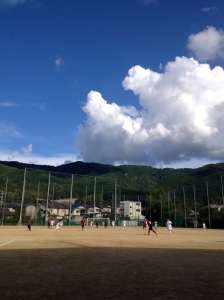 Soccer practice at the Toryo sandlot
Soccer practice at the Toryo sandlot
Baseball. America’s favorite pastime. The sport never held much excitement for me back in the States, but after a year of learning and living Japanese culture, few things have intrigued me as much as baseball. The history of the sport in Japan is almost as long as that in America, and the rules are identical as far as I can tell, but it certainly isn’t the same game. Through every encounter I’ve had with it – from a professional game in Osaka to the daily schoolyard practices – something about Japanese baseball has truly fascinated me. There’s something magical to the game here that can only be understood through time and personal experience. Once again I find myself with the challenge of explaining the unexplainable culture of Japan – this time with something so familiar yet so foreign to us Americans: 野球 – yakyuu – baseball.
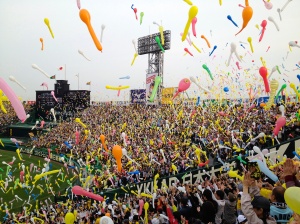 7th inning stretch at a Hanshin Tigers game
7th inning stretch at a Hanshin Tigers game
Baseball isn’t just sport in Japan. It’s like a higher calling. Much like a soldier is no less a soldier off the battlefield, there’s something about baseball that surpasses a mere pastime. We’ll start with the basics.
Buzzed heads. Even in a class of uniformed Japanese students, there’s no hiding the baseball boys. The hair, or scarcity of it, is like a uniform that can’t be removed.
Respect. I draw a lot of attention in the school hallways, as students call out my name (pronounced “joe-knee”) and give their best hello. But for the baseball students, it’s usually a sharp Japanese greeting with a stiff bow – just as they would for any other teacher.
Pure dedication. I’ll never forget looking out the window of the teacher’s room one afternoon to marvel at a sudden and fierce July downpour. What I saw intrigued me. In military formation, the entire baseball team was trudging through the muddy field, jogging in unison. Even above the roar of the rain, their fierce chanting could still be heard. Rain or shine, snow or sweat, these guys are the first ones in and the last ones out. Before I show up for work in the morning, they’re already on the field. As I take my lunch time-stroll, they’re already out there, soaking up puddles or repairing base lines. As I pack my bag to finish a hard day’s work, they’re still working.
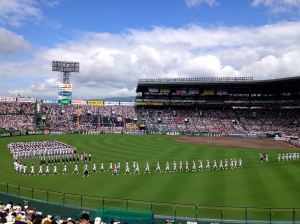 opening ceremony of the 2014 Summer Koshien tournament
opening ceremony of the 2014 Summer Koshien tournament
But what for? Why such relentless dedication to a sport? The answer is called the “Koshien Dream”. Every summer, the Hanshin Tigers pack their bags for about a month and surrender their home field advantage for the sake of high school baseball. Every prefecture across Japan sends one high school team to do battle on Japanese baseball’s biggest stage. How big is this tournament? Ever heard of Yankee’s pitcher Tanaka Masahiro? Koshien 2006. Ever heard of Suzuki Ichiro? Koshien 1991. The Koshien Dream is the dream in Japanese baseball. Students will even fill their pockets with dirt from the infield before the long bus ride home. This summer I had the honor of witnessing it myself. On a sunny Monday morning I woke up to take the first train to Nishinomiya (between Kobe and Osaka). With a few friends we claimed a free outfield seat and watched as the stadium surpassed maximum capacity for the opening ceremony of the 96th annual Koshien Summer tournament. The emotions were through the roof as the teams marched out onto the field in military formation. Every kid who plays baseball in Japan dreams of doing that march and hearing their school announced to a sold-out stadium and a nation watching on TV. I was tearing up just being a spectator.
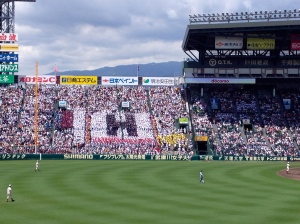 student section of Kyoto’s Heian High School showing some love for their boys on the field
student section of Kyoto’s Heian High School showing some love for their boys on the field
Yet there’s something slightly unsatisfactory about the Koshien answer. When I went back to work at Toryo the following week, I wasn’t surprised to find the baseball guys already there, sweating it out at their own sandlot. For them the Koshien Dream is nearly intangible. Getting past the powerhouse Kyoto Heian High School is a long shot to say the least. Yet still, they practice like every day is Koshien. I’ve never met a people group more driven and dedicated to their work than the Japanese. Baseball is one of the most pure examples of this. Perhaps they’re just being Japanese by giving their all for what they’ve been called to do. Yet I think there’s something even more to it than that. Maybe it’s simpler and more pure than we think. Maybe it truly is just a love of the game.

